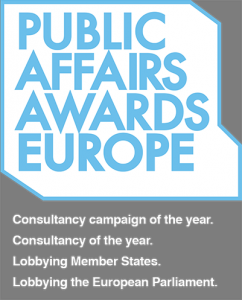 Alber & Geiger has been recognised for the fourth consecutive year as one of the top lobbying firms in Europe. The firm was shortlisted in four categories, including Lobbying the European Parliament, Consultancy Campaign of the Year and Consultancy of the Year by the Public Affairs Awards Europe 2018. Alber & Geiger picked up the award for the second year in a row in the Lobbying Member States category for its ability to generate Member State support at the EU level as well as work at national and local level in particular Member States.
Alber & Geiger has been recognised for the fourth consecutive year as one of the top lobbying firms in Europe. The firm was shortlisted in four categories, including Lobbying the European Parliament, Consultancy Campaign of the Year and Consultancy of the Year by the Public Affairs Awards Europe 2018. Alber & Geiger picked up the award for the second year in a row in the Lobbying Member States category for its ability to generate Member State support at the EU level as well as work at national and local level in particular Member States.
Alber & Geiger’s team has decades of experience in representing clients in Europe through a broad range of activity. Our team is involved in many EU policy issues and regulatory matters, as well as active before all EU institutions and agencies, in addition to special national and local officials at the Member State level in Europe. Many of Alber & Geiger’s practitioners have a deep understanding of EU legislative and administrative procedures.

 On 7 November 2018, the European Commission adopted a Communication on endocrine disruptors. The Communication lays the groundwork for potential, new regulatory measures that will address endocrine disruptors across different areas in the EU, and beyond.
On 7 November 2018, the European Commission adopted a Communication on endocrine disruptors. The Communication lays the groundwork for potential, new regulatory measures that will address endocrine disruptors across different areas in the EU, and beyond. In 2014, following threats to the rule of law in several Member States, the European Commission decided to launch a framework to address such systemic threats through dialogue with the concerned countries. Until now the process consists of an assessment of the problems, followed by concrete recommendations and a monitoring mechanism.
In 2014, following threats to the rule of law in several Member States, the European Commission decided to launch a framework to address such systemic threats through dialogue with the concerned countries. Until now the process consists of an assessment of the problems, followed by concrete recommendations and a monitoring mechanism. The European Commission is planning a regulation, which will tighten the limits on the use of facial recognition technology. The regulation would give EU citizens’ rights over the use of their facial recognition data, marking a precedent in how the EU regulates artificial intelligence.
The European Commission is planning a regulation, which will tighten the limits on the use of facial recognition technology. The regulation would give EU citizens’ rights over the use of their facial recognition data, marking a precedent in how the EU regulates artificial intelligence.
 The Mobility Package proposed by the European Commission risks to paralyse Europe. In April 2019, the European Parliament has approved its position to negotiate with the Council of the European Union on new rules concerning posting of drivers, rest times and cabotage. According to the European Commission, the new rules are expected to boost competitiveness and to improve social rights and working conditions of European drivers.
The Mobility Package proposed by the European Commission risks to paralyse Europe. In April 2019, the European Parliament has approved its position to negotiate with the Council of the European Union on new rules concerning posting of drivers, rest times and cabotage. According to the European Commission, the new rules are expected to boost competitiveness and to improve social rights and working conditions of European drivers. Alber & Geiger has been shortlisted in two categories by the prestigious The Lawyer European Awards 2019, namely: Law Firm of the Year Benelux and the European Energy and Infrastructure Deal of the Year.
Alber & Geiger has been shortlisted in two categories by the prestigious The Lawyer European Awards 2019, namely: Law Firm of the Year Benelux and the European Energy and Infrastructure Deal of the Year. The European Commission has initiated a public consultation to collect stakeholders’ evidence on the legal protection of design in the EU. The objective of this process is to evaluate if existing rules are still fit for purpose. The result may feed into an impact assessment and possible amendment to the current legislation.
The European Commission has initiated a public consultation to collect stakeholders’ evidence on the legal protection of design in the EU. The objective of this process is to evaluate if existing rules are still fit for purpose. The result may feed into an impact assessment and possible amendment to the current legislation.